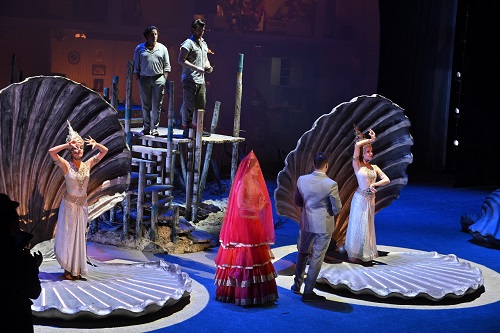 Spain Bizet, Les pêcheurs de perles: Liceu Chorus and Orchestra / Yves Abel (conductor), Gran Teatre del Liceu, Barcelona, 13 & 14.5.2019. (JMI)
Spain Bizet, Les pêcheurs de perles: Liceu Chorus and Orchestra / Yves Abel (conductor), Gran Teatre del Liceu, Barcelona, 13 & 14.5.2019. (JMI)

Production:
Director – Lotte de Beer (original), Dorike van Genderen (revival)
Sets – Marouscha Levy
Costumes – Jorine van Beek
Lighting – Alex Brok
Casts included:
Nadir – John Osborn/Dmitry Korchak
Leila – Ekaterina Bakanova/Olga Kulchynska
Zurga – Michael Adams/Borja Quiza
Nourabad – Fernando Radó/Federico de Michelis
The last time this Georges Bizet opera was performed at the Liceu was 55 years ago, when it starred Alfredo Kraus, the distinguished Spanish tenor. The current staging was uneven, but it did feature several stellar vocalists in the lead roles.
This Lotte de Beer production comes from the Theater an der Wien, where it premiered in November 2014. It is one of the director’s first works, and she tried to do a modern job of it, presenting the opera as the filming of a reality television show. At the front of the stage in Act I is a sort of beach, where the filming takes place, while at the back there is a large screen, where landscapes are projected and, sometimes, close-ups of the shooting can be seen. The screen also allows one to view rooms in the background, where TV viewers are following the reality show. In the second act, there is a temple where the idyll of Leila and Nadir takes place. Act III returns to the beach: a large cage is added, as if it were a prison. The costumes are modern and casual in all cases.
While the production may be original in its concept, it makes it difficult to follow the opera’s plot. The constant movement on stage has the great disadvantage of distracting the audience’s attention from the singing, although care is taken so that there is no movement in some of the arias. Judging by what is printed in the program, the artistic director of the Liceu is delighted with the production, an enthusiasm I do not share. Nor did the public: the creative team was received with sonorous booing.
Once again Yves Abel was in charge of the musical direction. His work was effective, although the orchestra was too loud in the first act. The orchestra and chorus were both correct, but they have given better performances in the past.
In the first cast, Nadir was played by tenor John Osborn, who returns to the Liceu for the first time since his outstanding performance as the protagonist of Benvenuto Cellini four years ago. On this occasion, his voice did not run well, and he had difficulties in the much-awaited aria, ‘Je crois entendre encore’, where there were falsetto sounds.
The second Nadir was tenor Dmitry Korchak, who starred in the Vienna premiere of this production. I had the opportunity to see him in this same character four years ago at the Palau de la Música in Valencia, and my assessment was positive. I found him even better this time. It must be acknowledged that ‘Je crois entendre encore’ is one of the most challenging arias ever written, and it takes a very solid technique to overcome the difficulties. Dmitry Korchak triumphed in it: his voice is well-suited and he sang with gusto and no trace of falsetto (which had been noticeable in Valencia).
The best vocal performance in the first cast came from Ekaterina Bakanova as Leila. I had heard her in Wexford in Mercadante’s Il bravo, and she has reconfirmed the positive impression she made then.
In the second cast Leila was played by the young soprano Olga Kulchynska, who was remarkable. She has appeared on this stage as Musetta, and in Peralada as Pamina, and she was most convincing. Her brilliant Leila confirmed my earlier opinion.
Zurga was played by baritone Michael Adams, whose voice was rather modest: there was a problem with projection. Borja Quiza did well as Zurga, although his voice is not extraordinary in quality or size, but it certainly could be heard in the theatre.
Fernando Radó did well as Nourabad, and went from being the Priest to directing the television program. Federico de Michelis in the second cast was satisfactory.
José M. Irurzun